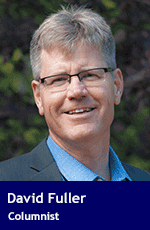 We were going 64 km/h in a 50 zone on our way to bury Larry when we got pulled over. When the police officer asked the reason why we were going so fast, we told him we were on our way to Larry’s funeral.
We were going 64 km/h in a 50 zone on our way to bury Larry when we got pulled over. When the police officer asked the reason why we were going so fast, we told him we were on our way to Larry’s funeral.
As he marched back to his car with my wife’s licence and insurance, I told my wife we would have to believe that Larry had some pull with the “Big Guy” if he could fix this one.
Larry was always part of something bigger. Running his organization, he often relied on divine intervention to ensure he had enough customers, the right people arriving to fill the employment vacancies and enough money to make payroll.
It’s not that Larry didn’t work hard – he did – but he didn’t sweat the small stuff.
Great people would turn up to fill his vacancies. The time he spent on marketing and sales ensured that his customers came in droves.
While his business acumen wasn’t his strongest asset, he always found a way to make ends meet, with a few dollars left over that he inevitably gave to someone who needed it more than he did.
You probably know a leader like Larry. They’re fun to be around because it’s not all about them. They’re generous with their resources, but they’re accountable and keep their employees accountable for getting the results they’ve promised to deliver.
They have a clear vision of what they should be doing and know how to get their team excited to be part of something bigger.
But what does it really mean to be part of something bigger?
Sometimes we’re so caught up in the struggles of our enterprises that we don’t realize the impact we’re having on the lives of other people, the environment and even the world.
As a business coach, I often have the opportunity, as an outsider, to observe the impacts that leaders unknowingly make.
For example, I’ve seen an owner provide a job to an employee and give her the responsibility to make decisions. While applauding her on those decisions, he’s built confidence in an apparently fragile young lady and that’s life-changing for her. This could positively affect her and her family for generations.
Or the owner of a retail business who dedicates years of passionate and caring service to her customers, enabling them to trust her implicitly as a friend and confidante. It’s difficult for us to comprehend that many people are lonely and only wish we could spend time listening to them.
I know the leader of an ecology company who’s passionate about only working on projects that are going to make the world better. While some people might view this type of aspiration as foolhardy, desires like this can change the world by attracting like-minded people to share in these altruistic ventures.
But it’s not only the big things that make a difference. It’s the small things that really count:
- when you took the time to learn something important from a staff member;
- the time you went over and beyond for a customer;
- the time you thanked your supplier for making a difference for you;
- when you recognized the contribution of one of your team who thought no one had noticed their accomplishment;
- it could be the little smile for a doorman, delivery driver or student that made their day;
- the tip you gave a driver;
- the honest staff review when you suggested that your employee might be happier doing something else;
- you may have shared an idea, offered a challenging question, or complemented on work well done.
As leaders, we might not believe there’s something bigger. But often, we don’t understand how we impact the lives of others.
Larry believed he was just a small cog in the wheel helping out the “Big Guy” and as a result, he made a difference in many lives.
That policeman who stopped us on the way to Larry’s funeral was also part of something bigger. A few minutes after pulling us over, he came back with the paperwork filled out, giving my wife a written warning and verbal notice that he wouldn’t be so easy next time if she didn’t slow down.
We did slow down – and we came to the conclusion that Larry might have had a word with his friend, the “Big Guy.”
Troy Media columnist David Fuller, MBA, is a certified professional business coach and author who helps business leaders ensure that their companies are successful. David is author of the book Profit Yourself Healthy. Email [email protected]
The views, opinions and positions expressed by columnists and contributors are the author’s alone. They do not inherently or expressly reflect the views, opinions and/or positions of our publication.

